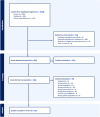Residential and inpatient treatment of substance use disorders in Sub-Saharan Africa: a scoping review
- PMID: 38212834
- PMCID: PMC10782522
- DOI: 10.1186/s13011-023-00589-0
Residential and inpatient treatment of substance use disorders in Sub-Saharan Africa: a scoping review
Abstract
Background: With substance use rates increasing in Sub-Saharan Africa (SSA), an understanding of the accessibility and effectiveness of rehabilitative services for people who use alcohol and other drugs (AOD) is critical in the global efforts to diagnose and treat substance use disorders (SUD). This scoping review seeks to address the gaps in knowledge related to the types of research that have been conducted regarding inpatient or residential SUD treatment in SSA, the settings in which the research was conducted, and the study countries.
Methods: A search of three databases, PubMED, Scopus, and African Index Medicus, was conducted for publications related to the treatment of SUD in inpatient or residential settings in SSA. Articles were screened at the title/abstract level and at full text by two reviewers. Articles eligible for inclusion were original research, conducted in SSA, published in English, included populations who received or were currently receiving treatment for SUD in inpatient or residential settings, or documented demand for SUD services.
Results: This scoping review included 82 studies originating from 6 countries in SSA. Three themes emerged within the literature: access and demand for inpatient and residential SUD treatment, quality and outcomes of SUD treatment, and descriptions of the services offered and staffing of these facilities. Barriers to access include financial barriers, limited availability of services, and geographic concentration in cities. Women were shown to access residential and inpatient SUD treatment at lower rates than men, and certain racial groups face unique language and financial barriers in accessing services. Studies indicate mixed success of inpatient and residential SUD treatment in sustained SUD remission for patients.
Conclusion: There are significant gaps in the literature, driven by a lack of longitudinal studies focused on patient outcomes following treatment and the use of a narrow definition of treatment success. Both structural and non-structural barriers, such as stigma and discrimination, are barriers to access. Further research is needed to evaluate approaches to mitigate these barriers and expand access to residential and inpatient SUD treatment.
Keywords: Addiction; And alcohol rehabilitation; Drug; Drug and alcohol treatment; Sub-Saharan Africa; Substance use disorders.
© 2024. The Author(s).
Conflict of interest statement
The authors declare no competing interests.
Similar articles
-
Recovery schools for improving behavioral and academic outcomes among students in recovery from substance use disorders: a systematic review.Campbell Syst Rev. 2018 Oct 4;14(1):1-86. doi: 10.4073/csr.2018.9. eCollection 2018. Campbell Syst Rev. 2018. PMID: 37131375 Free PMC article.
-
Availability, acceptability and uptake of Sexual Reproductive Health interventions for young people with disabilities in Sub Saharan Africa: A scoping review protocol.PLoS One. 2025 May 21;20(5):e0324364. doi: 10.1371/journal.pone.0324364. eCollection 2025. PLoS One. 2025. PMID: 40397940 Free PMC article.
-
Substance use and substance use disorder, in relation to COVID-19: protocol for a scoping review.Syst Rev. 2021 Feb 3;10(1):48. doi: 10.1186/s13643-021-01605-9. Syst Rev. 2021. PMID: 33536070 Free PMC article.
-
Barriers and facilitators to healthcare access for children with disabilities in low and middle income sub-Saharan African countries: a scoping review.BMC Health Serv Res. 2020 Jan 6;20(1):15. doi: 10.1186/s12913-019-4822-6. BMC Health Serv Res. 2020. PMID: 31906927 Free PMC article.
-
Barriers to accessing internationally controlled essential medicines in sub-saharan Africa: A scoping review.Int J Drug Policy. 2023 Aug;118:104078. doi: 10.1016/j.drugpo.2023.104078. Epub 2023 Jun 3. Int J Drug Policy. 2023. PMID: 37276779
Cited by
-
Prevalence of substance and hazardous alcohol use and their association with risky sexual behaviour among youth: findings from a population-based survey in Zimbabwe.BMJ Open. 2024 Jun 16;14(6):e080993. doi: 10.1136/bmjopen-2023-080993. BMJ Open. 2024. PMID: 38885985 Free PMC article.
-
Mental Health, Substance Use, and Tuberculosis Preventive Therapy in People With HIV: A Prospective Cohort Study.Open Forum Infect Dis. 2025 Jun 4;12(6):ofaf303. doi: 10.1093/ofid/ofaf303. eCollection 2025 Jun. Open Forum Infect Dis. 2025. PMID: 40567997 Free PMC article.
-
Exploring perceptions of the services offered in Tanzanian sober houses: a mixed- methods study among service users and providers.BMC Health Serv Res. 2025 Feb 14;25(1):253. doi: 10.1186/s12913-025-12384-7. BMC Health Serv Res. 2025. PMID: 39953582 Free PMC article.
References
-
- World Drug Report 2023 [Internet]. United Nations Office and Drugs and Crime; 2023. Available from: https://wdr.unodc.org/. Cited 2023 Jul 24.
-
- ENACTAfrica.org. Drug demand and use in Africa [Internet]. ENACT Africa; 2019. Available from: https://enactafrica.org/research/research-papers/drug-demand-and-use-in-.... Cited 2023 Sept 14.
-
- Alcohol [Internet]. World Health Organization; 2023. Available from: https://www.who.int/news-room/fact-sheets/detail/alcohol. Cited 2023 Jul 24.
Publication types
MeSH terms
LinkOut - more resources
Full Text Sources
Medical
Research Materials


